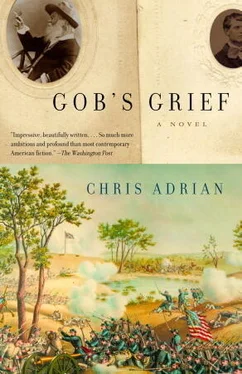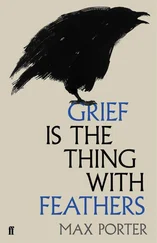But it wasn’t a spirit. It was a girl, wrapped in a white sheet, with her long blond hair let down so it dragged behind her as she ran among the trees, emitting the peculiar warbling sound. Her name was Alanis Bell. She was their neighbor. She lived at the bottom of the hill, and practiced a forbidden affection for the two boys. If her mama ever caught her talking to them, she got a beating with a splintered ruler.
“There you are,” she said, running over to Gob. The way her sheet covered her feet, it looked like she was floating. “Where are you going?” Tomo ran up beside Gob, panting and scowling.
“To the war,” said Tomo. He pulled at Gob to get him going, but Gob pushed his hand away. He thought Alanis Bell was fascinating, though Tomo hated her.
“To the war?” said Alanis Bell. She put her head back and made the warbling noise again.
“Hush up!” Tomo said to her. “You’ll get us caught!” But she kept warbling, until Tomo threw a stick at her. It struck her head, and stopped her warbling but did not make her quiet.
“I was mourning you!” she cried, rubbing her head. “I was mourning you like I mourn for Walter, but now you’ll get no mourning from me!” Walter was her brother, whose death at Shiloh had set her to running in the woods. “Now, I’ll be glad when you die! Go on! Get out of here. Go on and die! Two less Claflins in the world. Every good person will celebrate!”
“We’re Woodhulls, you goddamned idiot girl,” said Tomo. “Come along, Gob.” They left Alanis Bell cursing them in the hemlocks. They hadn’t walked for five more minutes, though, when Gob stopped.
“It’s a bad night to go to the war,” he said. “A person shouldn’t start a trip on a full moon.”
“The light’s best then,” said Tomo. “We better hurry.”
“It’s a bad thing,” said Gob, “to be cursed at the start of your trip. Let’s go tomorrow.”
Tomo stopped and turned around to face his brother. “Let’s go tonight,” he said. They had already stayed home on three other nights on account of Gob’s fretting. “Let’s go tonight or let’s not go at all.”
“Well,” said Gob. But he didn’t move as he was supposed to. The train whistle sounded in the distance.
“We got to go,” said Tomo.
“Well,” Gob said again. “We could not go, too.” It was brave of him, to make the suggestion. It was Tomo, five minutes older than he, who had always directed their lives.
“Not go?” said Tomo, immediately furious. “How could we not go? There’s not a reason in the world not to go.”
“I don’t want to go,” Gob said for the first time. He’d never said it before, not in so many words, because during all the daydreaming and planning, it had always seemed to him that they would not ever actually do it, and also because he was sure that whatever his brother wanted, he must come to want too. And yet he wanted not to go. He wanted nothing less than to go to the war.
“Well, why the hell not?” Tomo asked, very quietly, but his voice was full of anger.
“I just don’t want to,” Gob said simply. Tomo took him by the shoulders and gave him a shake. Gob said, “I’m afraid,” and Tomo shook him again.
“What’s to be scared of?” Tomo asked him. Did he think that Rebs were to be scared of? Rebs were to kill like a hole was to dig. And didn’t he know that Tomo would kill any Reb that dared bother his brother? While the train got closer, Tomo went on and on. He scolded and cajoled. He called Gob a bad brother and a false friend, he called him a yellow-bellied girl.
“You’ll run for that train before it’s too late,” Tomo said.
Gob said, “I’m afraid to die.” He closed his eyes and tried to screw his feet into the ground. “I’ll go tomorrow.”
“Will not, either,” said Tomo. He took a few steps away and said, “God damn you, then,” and he ran off. He ran towards the train, and Gob ran away from it. Gob ran past Alanis Bell’s white form, still darting and ululating among the hemlocks. He ran back home, to the birch tree that grew close up against the house. Only when he had climbed the tree to the height of their bedroom did he turn and look for his brother. He could see the smoke from the train hanging like a low cloud against the clear sky, but he couldn’t see the train, and he couldn’t see Tomo. While he was running he had been too afraid to feel regretful, but now he did feel that way. He pounded his fist against his head and cried, but though he felt very bad indeed, there was a strange elation in him. He felt a selfish happiness, a greedy appreciation of safety, there in the tree, and he could not reconcile that feeling with the noise of the train, with Tomo’s receding from him.
“Wait!” Gob said, thinking he would climb down the tree and run after Tomo. But haste made him clumsy. He fell from the tree, knocked his head against the ground, and bit his tongue. Then he was asleep for a while. Alanis Bell came up the hill to watch him, and she might have stroked his head or said a comforting word to him, but she was disgusted by the way his leg was twisted up at a terrible, unnatural angle, and she left him there. She went back to the little hemlock wood, where she ran and danced under the moon, and sang for her brother.
For a week Gob was senseless from the blow to his head, and when he woke he was transformed into a creature of regret. Every time he heard the train whistle blowing in the distance he thought how he had abandoned his brother, and been abandoned by his brother, how if he had not been afraid they would still be together. The brotherless days ran miserably one into the next, until Gob woke one night absolutely certain that Tomo had been killed. He tried not to believe it, for fear that his belief might make it so, but though he struggled against the knowledge, it was confirmed at the end of the summer, when Tomo’s body returned to Homer.
Gob was not supposed to be one of the pathetic, maudlin bereaved. Tears were appropriate for ordinary people, but Claflins were special; the lie of death was undone by their magic senses. His mama scolded him when he cried for his brother.
“The dead are not dead,” she said. “Would you cry if Tomo moved to Wyoming? The Summerland is closer than Wyoming.” This did nothing to comfort Gob. Wyoming seemed to him a place incredibly far away. In fact, he was not even sure where it was, and he knew it must be a place peopled exclusively by savages and bears. It was no place he wanted his brother to be. He said so, and his mother put her soft white hand over his mouth and told him again that the dead were not dead, but more alive even than the living. They dwelt happily in the Summerland.
Gob had cottoned to that notion when he was a child, but Tomo had always hated it. Now Gob hated it too. Now he suspected that the dead were dead, that death was like sleep without dreams, or like being locked in a dark wardrobe where you did not hear or smell or feel or touch, where you did not sleep or wake, where you did not even contemplate the darkness, but you were one with it, and it was a big, horrible nothing.
He asked his mama if she couldn’t bring Tomo back to visit. Couldn’t she talk to him? She said that she could. They put out all the lights in his room except for a single candle. She grew still and quiet, and then began to sway lightly from side to side. “Mama?” she said. “Is that you walking in the light? Is that you? Is that my brother Gob? How come you look so sad, Gob? Don’t you know I’m a living spirit? Don’t you know I’m walking by your side, and one day you’ll see me just like Mama does, when you’re a man? Don’t you know how it’s true, Gob?”
Gob thought he would float away from joy and relief, and grabbed at the mattress for purchase. He talked for a little while with Tomo, asking what it was like in the Summerland, if there were other children there, if he was treated nice. But his mama’s answers began to make him suspicious. He was an experienced humbugger, and something seemed to him not right. Was there a message for Alanis Bell? “Yes,” replied his mother, who knew nothing of Tomo’s hatred for the girl. “Tell her I miss my sweet friend.” Gob began to cry then, because he knew his mama was lying to him, because he felt certain in that moment that there was nothing beyond death but the filthy, silent grave. He fell back on the bed and imagined he was falling into a grave himself — he was falling, and he might have fallen forever if a furious rage had not come welling up in him. He opened his eyes and saw his mother peering down at him with concern. “Gob?” she said. “What’s wrong, brother?” He shouted at her, not words, just a howl, and he struck at her face with his fist. He chased her from his room, and when she was gone he pounded on the door he’d slammed behind her, and he howled and howled.
Читать дальше












